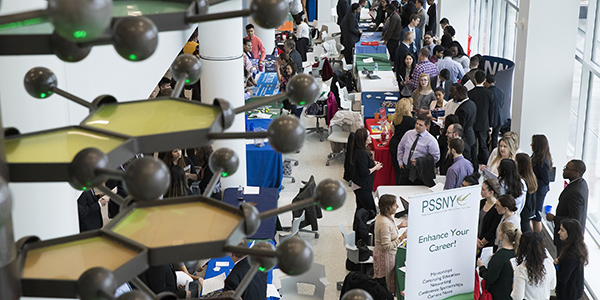School of Pharmacy hosts first Career Fair for students
Twenty organizations table for pharmacy connections

There was barely room to move during the first annual Career Fair held for pharmacy students in the atrium of the School of Pharmacy and Pharmaceutical Sciences on March 29.
By all measures, the afternoon that included tabling and a panel presentation was a success.
For an hour and a half, first- and second-year pharmacy students spoke with representatives from about 20 healthcare organizations, including institutional and community pharmacies, pharmaceutical companies, and public health and professional organizations, about career opportunities in pharmacy.
Sharon Collett, recruitment operations manager at Lourdes Hospital, was “pleasantly surprised” at the number and caliber of the students in the program.
“They’re professionals already. They asked excellent questions and were very intrigued by what the community has to offer that they never thought of,” she said. “We talked about community services and that we’re no longer just healthcare within four walls. As pharmacists, they will now be the resource that our medical staff and nursing professionals will rely on. They’re coming in with the latest and greatest ideas and have a lot to offer and to bring to the table.”
Neil Tierson, regional pharmacy manager at Kinney Drugs, has been to many career fairs at Albany, St. John Fisher and now Binghamton.
“We had great interactions,” he said. “We educate the students about the opportunities out there and for the profession in general and we cultivate relationships.”
Even being approached by so many students, it’s possible to make connections, he said. “You find the ones who are very interested and want to pursue further discussions with you. You can figure that out.”
And there were a lot of students to talk to. P2 student Raisa Nishat said it was definitely a positive event, but crowded. “The retail chains were more receptive when it came to accepting CVs and having internships available, so it ended up being an informative event. I grabbed as many business cards as possible and gained some insight into different hospital networks, but wish I could have spoken to them for a longer period of time!”
Following the tabling, five panelists provided students with information about residencies and how to prepare for them:
- Leigh Briscoe-Dwyer, vice president of network pharmacy at Westchester Medical Center
- Brent Carlson, PGY1 Pharmacy Residency Program Director at UHS Wilson Medical Center
- Luke Probst, executive director of pharmacy services at Upstate University Hospital in Syracuse
- Ali Scrimenti, PGY2 resident in geriatrics at Upstate University Hospital in Syracuse
- Karen Williams, founding director of the Guthrie Robert Packer Hospital PGY1 Pharmacy Residency program
When asked what makes a good residency candidate, Scrimenti said leadership and passion are important. “Now is the time to start looking into different organizations for ones your personal goals align with,” she said. “Keeping up your grades is important and an internship or real-life experience is good.”
Scrimenti warned students that they might have to travel to internship sites, but the opportunities are out there if you show some dedication.
Carlson said different programs look at different things when evaluating residency applicants. “Every program has a rubric,” he said. “We’re looking at academic grades, prior experience, do you have experience as an intern working in a hospital?
“You have to answer those behavior-based questions too, so a lot of the scoring happens at the interview. We’re looking for how flexible you are, does your personality mesh with what is going on in the hospital. We try to tease those things out. We want someone who is willing to learn, self-motivated and who can take constructive criticism and who we can learn from as well.”
“I want to see your passion,” Williams said. “The residency year is really hard – three years of experience crammed into one. You need grit and leadership is also important. Overall we want to see that you can balance things, keep your mental health and stay well for that year.”
For Probst, it boils down to fit. “Is your personality a match with ours? Are you assertive but not aggressive and not too reluctant? Are you confident but not overconfident? Will you fit in with your colleagues and department and the mindset of the organization?”
“I would add the need for good communication skills,” Briscoe-Dwyer said. “Ninety-nine percent of the world’s problems could be solved by better communications. Remember that you are an advocate for the department. You are the face of pharmacy and being able to recognize that and being a good representative of pharmacy is key.
“One thing each of us has is passion and my passion is advocacy,” Briscoe-Dwyer added. “Being aware of what those things are and being part of advocating for your profession is something that attracts me and always catches my eye.”
Panelists then explained their organizations’ selection processes. At Upstate University Hospital, Probst said it starts with a clinical meeting. “We get 100 or so applicants and winnow it down for the interview process.”
Williams said Guthrie Robert Packer Hospital looks for skills and fit and then ranks applicants.
Carlson warned that it’s a long process. “Professionalism, communication, we rate on all those then rank applicants and get a number out of the eight or 10 columns and put them in a highest to lowest list and discuss it,” he said. “Does this candidate’s goals align with what we offer? I suggest you look up the national matching website for pharmacists and it generally favors the candidate’s top picks.”
